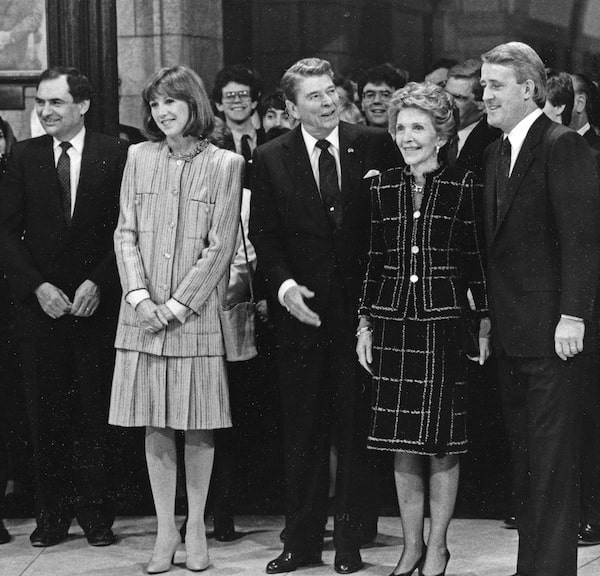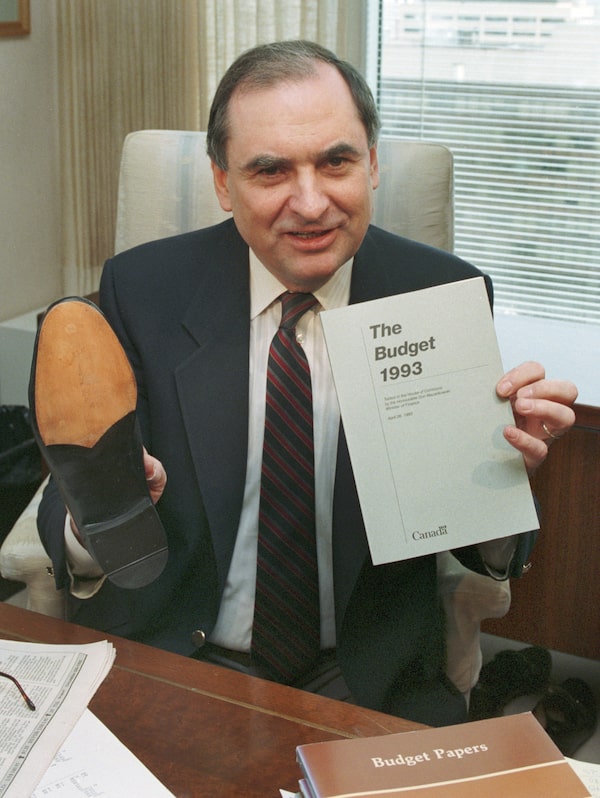
Don Mazankowski, deputy prime minister and House leader, in the halls of Parliament in Ottawa, in September, 1986.Tim McKenna/The Globe and Mail
It was September of 1984 and a triumphant Progressive Conservative Party under Brian Mulroney had just swept into power in a landslide victory. A nervous Benoît Bouchard, a newly minted MP from rural Quebec, was sworn in as minister of state for transport to work under a political veteran, Transport Minister Donald Mazankowski.
There was a slight problem. “I asked to meet him, knowing full well that he didn’t speak any French and I spoke no English,” Mr. Bouchard recalled this week. “I got a warm welcome but we didn’t utter a word.”
After a difficult few months, the two men became true friends and confidants. The tall, imposing MP from Vegreville, Alta., was Mr. Bouchard’s closest friend in Ottawa over the next decade, even when Mr. Bouchard came close to quitting federal politics over the failure of the Meech Lake constitutional accord.
“His generosity with others won him the respect of all parliamentarians,” said Mr. Bouchard, now retired in his hometown of Roberval, Que. “In the five departments that I led from 1985 to 1993, he remained my best adviser. He tempered my impetuous ‘Québécois’ character, all the while respecting the particular situation of a Québécois in Ottawa after the 1980 referendum.”
And there was a personal connection too. In 1993, Mr. Bouchard travelled to Vegreville to get to know Alberta and Mr. Mazankowski reciprocated with a trek to Roberval. Mr. Bouchard was worried about language again since his constituents didn’t speak any English. But the ice was broken at a local dinner when Mr. Mazankowski took out his fiddle and began to play from his country music repertoire. He was a hit, Mr. Bouchard recalled.

Don Mazankowski, Mila Mulroney, Ronald and Nancy Reagan, and Brian Mulroney on Parliament Hill in Ottawa, on April 6, 1987.ERIK CHRISTENSEN/The Globe and Mail
Mr. Mazankowski, a giant of Canadian politics whom Prime Minister Mulroney dubbed his “chief operating officer” but was most commonly known as “Maz,” died on Oct. 28 in Sherwood Park, Alta., of complications from Parkinson’s disease. He was 85.
During a political career spanning 25 years, the onetime car dealer took on a series of key roles, as transport minister, House leader, deputy prime minister and finance minister, all the while retaining a down-home demeanour and lack of pretentiousness that won him friends and allies across the political divide.
“For seven years, we worked intimately together developing a relationship that was solid as a rock, built on mutual trust and genuine affection,” Mr. Mulroney recalled, marvelling at the respect he garnered from all sides. “He could come to the House of Commons on a major controversial issue with the opposition howling on the other side and get through it without losing a friend.”
Donald Frank Mazankowski was born on July 27, 1935, in Viking, Alta., 120 kilometres east of Edmonton. His parents, Frank and Dora Mazankowski, who were of Polish origin, had emigrated from the United States and operated a grain farm.
The youngest of three boys, he attended a one-room schoolhouse but showed ambition early on. He became fascinated by the activity at the local hardware store and decided he wanted more. “I had one burning desire and I had my mind set on it as I grew up,” he told Maclean’s magazine in 1992. “I wanted to be the one doing the selling rather the buying.”
After finishing high school and working for a time as a trucking dispatcher in Chicago, Mr. Mazankowski returned home and began his career as an entrepreneur, eventually opening Raydon Motors in Vegreville, with his brother Ray. He soon caught the political bug.
Impressed by John Diefenbaker’s promotion of Western Canadian interests as prime minister, Mr. Mazankowski was smitten with politics. He was elected in 1968 as MP for Vegreville, the first of seven election wins.

Then finance minister Don Mazankowski displays a copy of the budget brief along with his resoled shoes in his office in Ottawa on April 16, 1993.Fred Chartrand/The Canadian Press
After serving as an opposition MP for 10 years, he was appointed transport minister under the short-lived government of Joe Clark in 1979, later returning to the portfolio with the Mulroney government, and became a leading voice for Western Canada.
In transport, he oversaw the privatization of Air Canada and reform of rail transportation, including the contentious issue of grain rates. He was a big booster of Western economic diversification and a backer of U.S.-Canada free trade.
Despite his heavy workload, Mr. Mazankowski’s loyalty to Vegreville never faltered. He lived in Ottawa with a couple of fellow MPs in a spartanly-furnished apartment and headed home every weekend. David Dodge, who was Deputy Minister at Finance, would often accompany him on these journeys, figuring it was the best time to get one-on-one time with a busy minister.
“We’d fly out commercially on Fridays and he’d have this ratty old Oldsmobile parked at the Edmonton airport,” said Mr. Dodge, who later became Governor of the Bank of Canada and served with him on corporate boards in later years. After the hour-long drive to Vegreville, Mr. Dodge would check into the Wild Rose Inn, a local motel.
On Saturday morning, Mr. Mazankowski would take care of constituency business. Mr. Dodge would then spend a long afternoon with his minister working on files. Mr. Mazankowski’s wife, Lorraine, would make them dinner. Then it would be back to work on Sunday morning before returning to Ottawa by air later that day.

Don Mazankowski, seen here on Jan. 20, 1976, had a political career spanning 25 years.FRED CHARTRAND/The Canadian Press
“He was a wonderful guy to work with,” Mr. Dodge said. “He had an amazing sense of numbers. He wasn’t an accountant, a green eye-shade type of guy, but he had a very good sense of where the economy was going and a very good political sense.”
Mr. Dodge remembers Mr. Mazankowski’s relatively brief tenure in finance as a tumultuous time, coming after the unpopular imposition of the Goods and Services Tax. “It was a tough, tough job in those years. We were being eaten alive by interest charges.”
Greg Ebel was in his mid-20s and working as a legislative assistant for the minister of privatization when Mr. Mazankowski asked him to serve as his chief of staff at Finance. “He was a great boss,” said Mr. Ebel, who went on to a successful career in the energy business and is now chair of Enbridge. “He always worked harder than you did.”
Mr. Mazankowski also counted many friends on the opposite side of the political divide. John Manley first got to know Mr. Mazankowski after he was elected as a Liberal MP in 1988 and became finance critic.
“Mr. Mazankowski was first and foremost a parliamentarian. He loved the institution. He could be combative and he could be partisan but never with hostility and vitriol, which is why he had friends in every party,” Mr. Manley recalled.
When the Conservatives were swept out of power in 1993 and Mr. Manley became a minister in the Chrétien government, “one of the first pieces of correspondence I got was a multi-page, handwritten letter from Don Mazankowski saying, ‘If there’s anything I can ever do to help, please let me know.’”
“He was one of those people who believed it was about public service and not about who won and who lost,” said Mr. Manley, who later served himself as finance minister and as deputy prime minister. “It was why I loved him and why so many of us loved him.”
Mr. Mazankowski never lost touch with his roots, says Tim McPhee, Vegreville’s Mayor. “He never changed who he was. He was the same at a G7 meeting as he was in line at the Co-op grocery store.” And Vegreville never forgot their most famous son, erecting a statue in his honour at the local museum.
After leaving politics in 1993, Mr. Mazankowski served as a corporate director at prominent companies including ATCO Ltd., Power Corp. of Canada, Weyerhauser Co. and Shaw Communications Inc.
Although he never had the opportunity to attend university himself, Mr. Mazankowski became a big proponent of post-secondary education, establishing the Don Mazankowski Scholarship Foundation in 1985 and serving on the University of Alberta’s Board of Governors.
He was active in a series of other organizations and in 2002 chaired a review of Alberta’s health system for the government of Premier Ralph Klein, which recommended a series of wide-ranging changes including an expanded role for private financing of the system.
Mr. Mazankowski’s involvement in health care was honoured with the 2018 opening of the $217-million Mazankowski Alberta Heart Institute at the University of Alberta Hospital.
Named an officer of the Order of Canada in 2000, he was promoted to companion in 2013, the order’s highest rank. He was awarded honorary degrees by the University of Alberta and the Technical University of Nova Scotia. But perhaps his greatest award was the designation in June of 1993 of the title “Right Honourable,” normally reserved for prime ministers.
Mr. Mazankowski, who was married for 62 years, leaves his wife, Lorraine; sons, Greg, Roger and Don; seven grandchildren; and two great-grandchildren.